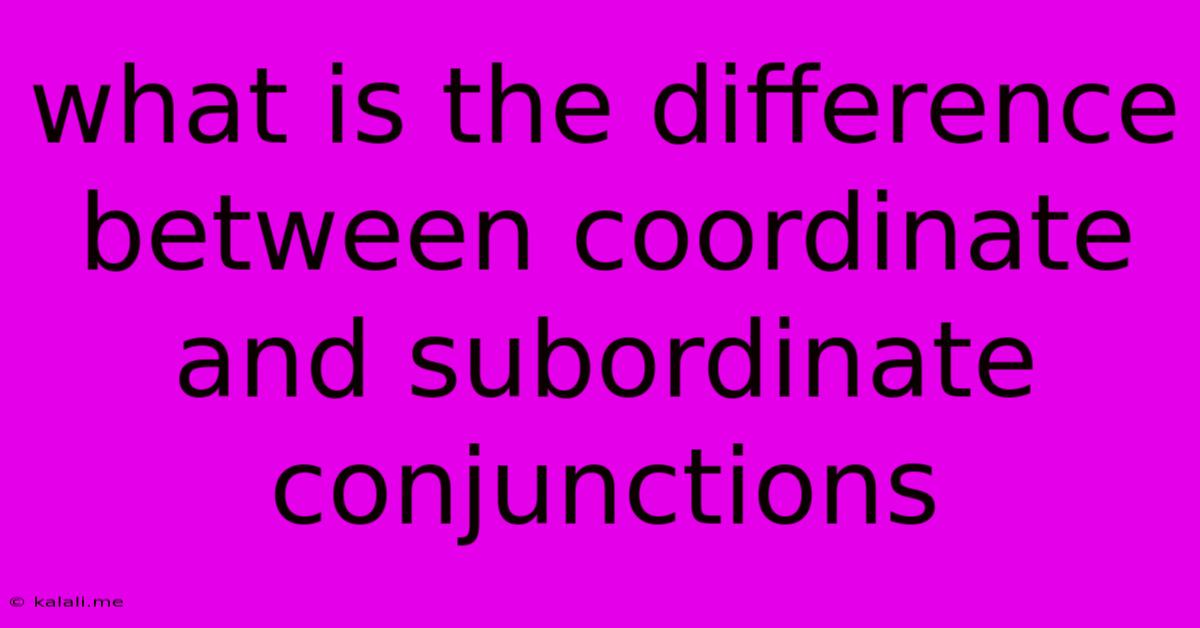What Is The Difference Between Coordinate And Subordinate Conjunctions
Kalali
Jun 12, 2025 · 3 min read

Table of Contents
What's the Difference Between Coordinate and Subordinate Conjunctions? A Comprehensive Guide
Understanding the nuances of conjunctions is crucial for crafting clear and grammatically correct sentences. This article will delve into the key differences between coordinate and subordinate conjunctions, providing you with a comprehensive guide to mastering their usage. Learn how to identify and effectively utilize these essential grammatical elements to elevate your writing.
Coordinate and subordinate conjunctions are both connecting words, but they function differently within a sentence. Coordinate conjunctions join words, phrases, or clauses of equal grammatical rank, while subordinate conjunctions connect a dependent clause to an independent clause. This seemingly subtle distinction has a significant impact on sentence structure and meaning.
Coordinate Conjunctions: Joining Equals
Coordinate conjunctions, often remembered by the acronym FANBOYS (For, And, Nor, But, Or, Yet, So), connect grammatical elements of equal weight. This means they link clauses, phrases, or words that could stand alone as independent units.
-
Examples:
- For: I went to the store, for I needed milk. (Two independent clauses)
- And: She sings beautifully, and she plays the piano expertly. (Two independent clauses)
- Nor: He didn't study, nor did he attend the lectures. (Two independent clauses)
- But: The weather was terrible, but we still went for a walk. (Two independent clauses)
- Or: Would you like tea, or coffee? (Two independent clauses – in this example, they're also questions)
- Yet: She's tired, yet she continues to work. (Two independent clauses)
- So: It was raining heavily, so we decided to stay inside. (Two independent clauses)
Notice how each example contains two complete thoughts that could stand alone as separate sentences. The coordinate conjunction simply links them together, showing the relationship between the two ideas.
Subordinate Conjunctions: Connecting Unequals
Subordinate conjunctions, unlike their coordinate counterparts, connect an independent clause (a complete thought) to a dependent clause (an incomplete thought). The dependent clause cannot stand alone as a sentence. These conjunctions indicate the relationship between the independent and dependent clauses, showing how one idea modifies or qualifies the other.
-
Examples:
- After: After the rain stopped, we went outside. ("After the rain stopped" is a dependent clause; "we went outside" is an independent clause.)
- Although: Although he was tired, he finished the race. ("Although he was tired" is a dependent clause; "he finished the race" is an independent clause.)
- Because: We stayed home because it was raining. ("Because it was raining" is a dependent clause; "we stayed home" is an independent clause.)
- Before: Before you leave, please turn off the lights. ("Before you leave" is a dependent clause; "please turn off the lights" is an independent clause.)
- Since: Since I was a child, I have loved to read. ("Since I was a child" is a dependent clause; "I have loved to read" is an independent clause.)
- If: If it snows tomorrow, we'll build a snowman. ("If it snows tomorrow" is a dependent clause; "we'll build a snowman" is an independent clause.)
- Unless: We'll go to the beach unless it rains. ("Unless it rains" is a dependent clause; "we'll go to the beach" is an independent clause.)
- While: While I was cooking dinner, the phone rang. ("While I was cooking dinner" is a dependent clause; "the phone rang" is an independent clause.)
Subordinate conjunctions introduce a wide variety of relationships, including time, cause and effect, condition, contrast, and concession. Understanding these relationships is key to using them effectively.
Key Differences Summarized
| Feature | Coordinate Conjunctions | Subordinate Conjunctions |
|---|---|---|
| Function | Join elements of equal grammatical rank | Connect an independent clause to a dependent clause |
| Clauses | Joins independent clauses (or words/phrases) | Joins an independent and a dependent clause |
| Sentence Type | Creates compound sentences | Creates complex sentences |
| Examples | FANBOYS (For, And, Nor, But, Or, Yet, So) | After, Although, Because, Before, Since, If, Unless, While, etc. |
Mastering the differences between coordinate and subordinate conjunctions is a crucial step in improving your writing skills. By understanding their distinct roles, you can construct more complex and nuanced sentences that effectively convey your intended meaning.
Latest Posts
Latest Posts
-
A Kilobyte Is Equal To Approximately One Bytes
Jun 13, 2025
-
Glucose Is Stored In Plants In The Form Of
Jun 13, 2025
-
Which Layer Is The Closest To Earth
Jun 13, 2025
-
Lcm Of 8 15 And 10
Jun 13, 2025
-
Who Developed The Concept Of Mental Age
Jun 13, 2025
Related Post
Thank you for visiting our website which covers about What Is The Difference Between Coordinate And Subordinate Conjunctions . We hope the information provided has been useful to you. Feel free to contact us if you have any questions or need further assistance. See you next time and don't miss to bookmark.